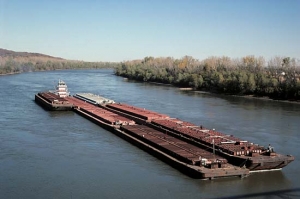


(Posted on 22/12/20)
The National Grain and Feed Association (NGFA) in the USA has commended Congress for including key inland waterways and port legislation – one of its major 2021 legislative priorities – in the fiscal 2021 omnibus spending bill approved Monday night.
“An efficient waterborne transportation system is crucial for growing the American economy and maintaining and creating U.S. jobs, and is vitally important to the continuing competitiveness of U.S. agricultural exports and their positive contribution to the U.S. balance of trade,” said Bobby Frederick, NGFA’s vice president of legislative affairs and public policy. “Since 2014, each Congress has passed a WRDA into law, and NGFA has viewed each bill as an opportunity to enhance U.S. inland waterways and port infrastructure. WRDA 2020 ensures continued investment in U.S. waterways infrastructure, helps bring U.S. waterways infrastructure into the 21st century and will help maintain American agriculture’s competitive transportation advantage against other countries. NGFA commends House and Senate lawmakers for bringing this bipartisan legislation to the point of enactment.”
Most significantly, the WRDA 2020 bill amends the cost-share formula for inland waterway projects for the next decade to provide that 65 percent of the funding be derived from taxpayer revenues and 35 percent from barge diesel fuel tax user fees deposited in the Inland Waterway Trust Fund. Currently, the funding formula is split 50:50. The trust fund consists of revenues generated by barge fuel taxes assessed against commercial users of the inland waterways.
It is estimated that the change in the funding formula will result in an additional $100 million annually being available for lock-and-dam renovation, including long-overdue rehabilitation of the locks and dams on the Upper Mississippi and Illinois Waterway. “It is well known that the majority of these locks and dams have outlived their 50-year design life and changing the cost-share is one prudent way to address this problem and bring U.S. waterways infrastructure into the 21st century more quickly,” Frederick said.
The bill also would provide access to the existing balance of funds within the Harbor Maintenance Trust Fund (HMTF) over a 10-year period to facilitate port-dredging activities. Currently, around $10 billion has been collected and deposited into the fund, but has gone unspent for its intended purpose. Allowing increased use of the HMTF corrects “the fiscal disservice” to those that pay the 0.125 percent ad valorem tax based upon the value of cargo imports, and would help restore the United States’ comparative transportation advantage, NGFA noted.
NGFA, established in 1896, consists of more than 1,000 grain, feed, processing, exporting and other grain-related companies that operate more than 7,000 facilities and handle more than 70 percent of all U.S. grains and oilseeds.
ADM and Mitsubishi Corporation have signed a non-binding memorandum of understanding to form a strategic... Read more
ESL Shipping and global steel manufacturer SSAB have agreed on a multi-year extension of the agreement... Read more
Anglo American’s Sakatti copper and polymetallic project in Finland has been designated as a &... Read more
FEFAC, representing the EU compound feed and premix manufacturers, noted with deep concern the announced... Read more
Catering to the growing demand from India’s confectionery, infant formula, and dairy sectors,... Read more
Khalifa Economic Zones Abu Dhabi – KEZAD Group, the largest operator of integrated and purpose... Read more
Rio Tinto will invest $1.8 billion1 to develop the Brockman Syncline 1 mine project (BS1), extending... Read more
Catherine Cobden, President and CEO of the Canadian Steel Producers Association (CSPA), has released... Read more
Enough domestic ferrous scrap is available for electric arc furnace (EAF) steelmakers to supply nearly... Read more
Cargill’s Ocean Transportation business and leading tanker shipping company, Hafnia, have joined... Read more